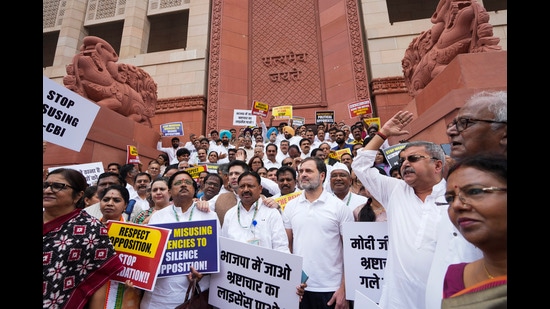Jul 09, 2024 09:14 PM IST
Going ahead, we are likely to see considerable friction between the ruling party and the Opposition. While it’s a given that the treasury and Opposition benches must cooperate in Parliament, the onus is much more on the ruling party to run the House smoothly
As expected, the short first session of the 18th Lok Sabha marked a sharp deviation from the last two Lok Sabhas. From 2014 to 2024, we had seen a Parliament where there was little deliberation and even less accountability. Critical legislation was pushed through without meaningful scrutiny from a dispirited Opposition and the committee system was largely bypassed. With an assertive Opposition that now has 234 seats, the optics and dynamics of Parliament have already dramatically changed.

Perhaps the most visible sign of the changed situation was the appointment of Rahul Gandhi as the Leader of the Opposition (LoP) in the Lok Sabha, a post that lay vacant for the past decade due to the inability of any party to meet the minimum threshold. Gandhi’s debut speech as LoP during the motion of thanks to the President’s address was also a sign of the changed times. It was combative and raised some of the burning national issues, such as the mishandling of the NEET examination. He did not shy away from taking Prime Minister (PM) Narendra Modi head-on. Gandhi’s speech had as much to do with the increased numbers behind him as also the diminished numbers of the treasury benches behind Modi.
That Gandhi’s speech had made an impact was apparent from the repeated interjections by several Bharatiya Janata Party (BJP) members, including ministers, during the speech. In what was probably a first, Modi rose from his seat twice to dispute Gandhi.
The next day, Modi predictably responded with an even longer speech which was continually interrupted by the Opposition benches. Much of his speech was a continuation of his election pitch rather than a presentation of his government’s agenda for the next five years. Just as during the campaign, the Congress and its failings occupied centre stage and not his government’s achievements. While there were references to the government’s future agenda, a chunk of the speech was devoted to running down the Congress and mocking Rahul Gandhi.
The tenor of the PM’s speech, however, gave the impression that he and the BJP have not acknowledged their diminished strength in the House. The speech made it clear that the government was unwilling to yield to any of the Opposition demands. This had been apparent in the way the ruling BJP-led National Democratic Alliance (NDA) handled the Opposition’s demand for the deputy speaker’s position that has been vacant since 2019. While there is nothing in the rulebook that says the Opposition should get the deputy’s speaker’s post, this was a convention put in place in 1977 when the Janata Party offered the deputy speaker’s position to the Congress. Since then, the deputy speaker has by and large been from the Opposition.
The decision by the Opposition to contest the Speaker’s post stemmed partly from the NDA’s intransigence on the deputy speaker. It had also something to do with the renomination of Om Birla, someone who has not endeared himself to the Opposition by suspending as many as 100 members in one session of the last Lok Sabha. In this session, too, he expunged several portions of Rahul Gandhi’s debut speech. This is not unusual since, with rare exceptions, Speakers of the House have seldom been above party affiliations in the Indian Parliament. Arvind Datar, a prominent lawyer, summed up this paradox: “A Speaker who continues to be a member of the ruling party is like an umpire being appointed by the batting side.” Coming back to the PM’s speech, the Opposition shouted slogans in the Lok Sabha while he was speaking, and in the Rajya Sabha, the Opposition walked out during Modi’s speech. There has been much handwringing about this both within and outside Parliament.
However, we must not get too sanctimonious and forget that disruptions have a long history in Parliament, as do walkouts. Indeed, as early as 1963, a member tried to disrupt the President’s address to the two Houses. From the 1970s, disruptions became fairly common. Legendary parliamentarian Hiren Mukherjee noted in a report in 1972 that normally no one would “like to disturb an occasion like the President’s address” but if “circumstances happen to be somewhat abnormal in the country” it might be “the duty of Opposition parties in Parliament to focus attention on the people’s discontents even on such an exceptional occasion”. Similar sentiments were voiced much later by the BJP’s Arun Jaitley to justify the 2G protests that paralysed Parliament over the 2G scam in 2010-11. Atal Bihari Vajpayee, on the other hand, made a distinction between walkouts and disruptions saying that the “most effective way to oppose someone is a walkout” and it should be considered the “highest form of opposition or antagonism”.
Going ahead, we are likely to see considerable friction between the ruling party and the Opposition. While it’s a given that the treasury and Opposition benches must cooperate in Parliament, the onus is much more on the ruling party to run the House smoothly. That spirit has been missing in the past 10 years and continues to be so in the new Lok Sabha. A popular news channel recently made a distinction between a robust and a rowdy Opposition. That’s a false dichotomy. The Opposition can be both as long as it does not stall Parliament. In a noisy and cacophonous democracy, such as India, it is unrealistic to expect otherwise.
Ronojoy Sen is with the National University of Singapore. He is the author of House of the People:Parliament and the Making of Indian Democracy.The views expressed are personal
Story Saved


